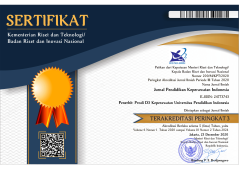Translation and Culture Adaptation of Problems and Needs of Palliative Care Questionnaires for Use in Older People in Indonesia
Abstract
Identifying problems that affect the quality of life and the need for care generally requires using a unique screening tool with the same characteristics as those used to achieve goals. However, in a clinical setting, palliative care problems and needs are given less attention and are poorly understood. In addition, there is currently no validated instrument for measuring the problems and needs of palliative care in older people. This study aimed to develop and validate a new instrument that assessed palliative care problems and needs in older people. Items were generated through a review of the literature and refinement by an expert. The instrument was psychometrically evaluated using construct validity with convergent and discriminant validity. At three community centers in Bandung, Indonesia, 187 older people completed the final instrument. According to the confirmatory validity test, 35 items were found to be valid. For a problem section, the factor loading ranged from 0.17 to 0.67 and for the need section from 0.17 to 0.61. Scale reported good convergent and constructed validity A 35-item psychometric properties assessment of palliative care issues and needs of older people. This instrument will be clinically useful in providing a systematic way to assess problems and needs of palliative care in older people as primary data and care management evaluation. Additional research should be conducted to examine alternative methods for establishing construct validity.
Keywords
References
Ainsworth, B., Cahalin, L., Buman, M., & Ross, R. (2015). The current state of physical activity assessment tools. Progress in cardiovascular diseases, 57(4), 387-395.
Altin, S. V., Finke, I., Kautz-Freimuth, S., & Stock, S. (2014). The evolution of health literacy assessment tools: a systematic review. BMC public health, 14, 1-13.
Bolarinwa, O. A. (2015). Principles and methods of validity and reliability testing of questionnaires used in social and health science researches. The Nigerian Postgraduate Medical Journal, 22(4), 195–201.
Colón-Emeric, C. S., Whitson, H. E., Pavon, J., & Hoenig, H. (2013). Functional decline in older adults. American family physician, 88(6), 388–394.
Haapio, A., & Viitaniemi, P. (2008). A critical review of building environmental assessment tools. Environmental impact assessment review, 28(7), 469-482.
Isidori, A. M., Pozza, C., Esposito, K., Giugliano, D., Morano, S., Vignozzi, L., ... & Jannini, E. A. (2010). Outcomes assessment: Development and validation of a 6-item version of the Female Sexual Function Index (FSFI) as a diagnostic tool for female sexual dysfunction. The journal of sexual medicine, 7(3), 1139-1146.
Osse, B.H., Vernooij, M.J., Schade, E., and Grol, R. P. (2004). towards a new clinical tool for needs assessment in palliative care of cancer patients: the PNC instrument. Journal of Pain and Symptom Management, 28, 329–341.
DOI: https://doi.org/10.17509/jpki.v7i1.26229
Refbacks
- There are currently no refbacks.
Jurnal Pendidikan Keperawatan Indonesia(JPKI) published by Indonesia University of Education. JPKI is licensed under a Creative Commons Attribution-ShareAlike 4.0 International License.
Office :
Nursing Department. FPOK UPI.
229, Dr. Setiabudhi Street. Bandung 40154
West Java , Indonesia
E-mail : jpki@upi.edu

_.png)
_.png)
_.png)











